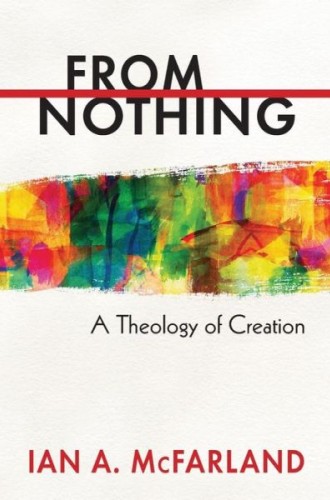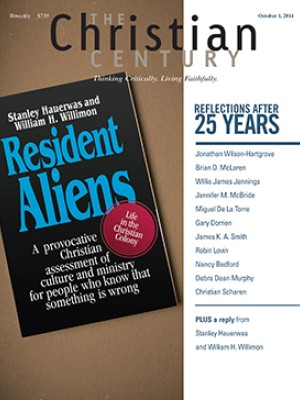Creation ex amore
This is a book about nothing. Nothing limits God. Nothing exists apart from God. Creation is grounded in nothing but God. That’s a lot to say about nothing.
Ian McFarland, professor of theology and associate dean of faculty and academic affairs at Emory’s Candler School of Theology, defends the classic Christian teaching that God creates ex nihilo, out of nothing. His defense does not depend on scripture, which is ambiguous on this question. Rather, he contends that creatio ex nihilo makes dogmatic, or doctrinal, sense.
Note the present tense: God creates. Our term creation does not refer to an origin back in the book of Genesis or at the Big Bang. Rather, God’s action of creating the world out of nothing is ongoing, contemporary, continuing (creatio continua). “It seems to me that the Christian doctrine of creation is only marginally concerned with the question of the world’s temporal origin. Far more fundamentally, the doctrine of creation from nothing is a proposal about the character of God’s relationship to the world.”
Read our latest issue or browse back issues.
I refer to this position as a constitutional account of creation out of nothing, rather than a temporal account. In both the temporal and constitutional accounts the same point is made: the created world is totally dependent on God for its existence. Thomas Aquinas, on whom McFarland depends for much of his doctrinal reflection, ascribes the constitutional account to philosophy and the temporal account to scripture. Similarly, McFarland draws most of his argumentation from dogmatic deliberation rather than biblical exegesis.
Our creating God is trinitarian. The Father creates through the Son in the Spirit. God’s internal relationality (perichoresis) is extended beyond the divine life to creatures whom God brings into existence as an act of grace and love. McFarland writes:
Interpreted Christologically, the claim that nothing limits God is not primarily a claim about God’s power over the creature and still less about God’s independence from creation. On the contrary, its focus is God’s freedom to enter into creation in order to bind created life to God from within by making it nothing less than God’s own life.
Like many classical trinitarian theists during the final third of the last century, McFarland places the historical activity of creation within the trinitarian life of God. All of this is well and good. Yet we must attend to a bear market on the theological stock exchange. The price of creation out of nothing is falling. Modern creatures do not like the idea of total dependence on a single all-powerful God, so they are buying stock in assertions of creaturely efficacy, if not co-creatorship with the divine.
Some feminist theologians object to the doctrine of creation out of nothing as a product of patriarchy’s image of God as male—as emphasizing discontinuity between God and creation. In contrast, applying the image of a mother giving birth would provide a substitute idea of God that emphasizes continuity between creator and creation. Similarly, eco-theologians object to creation out of nothing because it desacralizes planet Earth, just at a time when we humans should be revering and caring for the divine matrix that gives and sustains life. In addition, Whiteheadian process theologians, who advocate panentheism, repudiate creation out of nothing because it allegedly sponsors an image of God as arbitrary, distant, uninvolved, uncaring, and even tyrannical. All three of these divestments in creation out of nothing share one complaint in common: creatio ex nihilo so separates the Creator God from the creation that creatures feel either dominated or abandoned.
McFarland does not address all of these divestments in detail. Yet he does defend creatio ex nihilo from process theology’s “claim that creation from nothing renders God arbitrary.” McFarland objects to the Whiteheadian process school for two reasons: first, it subjects God to a more comprehensive metaphysical scheme, and second, it denies God sovereignty over creation. But this merely reiterates the classical position without a detailed counterargument. What McFarland needs to say with greater force and clarity is that the God of creation out of nothing invests the divine self in a creation whose very existence is the product of divine grace and love. McFarland comes close: “It is in Christ that creation is revealed as a matter of grace alone, and thus as grounded solely in God’s love.”
McFarland’s explication of creation out of nothing presents the classic theistic position. From Nothing would make an excellent textbook for students of theology, and I recommend it to that readership. Even so, two items are missing: a more extensive examination of contemporary natural science and a more ontological analysis of the eschatological new creation.
First, science. McFarland offers two very brief, though insightful, references to current scientific conversation, one to indeterminism in quantum physics and the other to the question of progress within evolutionary theory. But overall, McFarland believes that scientific knowledge and Christian reflection on creation have nothing to say to one another. I particularly regret his assertion that his position is “completely unaffected by the scientific question of whether or not (let alone when) the world had a temporal beginning.”
But a lively debate is currently taking place in science over the Big Bang as a singularity, the edge of time, the possible existence of multiple universes, fine tuning the anthropic principle, and so on. In addition, the new movement in our universities known as Big History, partially funded by the Bill and Melinda Gates Foundation, is trying to supplant religious stories of origin with its own scientific story of origin. A cultural contest is raging over the concept of the universe and its relation to whatever might lie beyond. The world outside the church is badly in need of informed and sophisticated engagement on what we Christians call creation. McFarland unnecessarily sequesters his Christian reflection in a church library just when it should be called out into the public square.
Second, eschatological ontology. When we look at the biblical symbols we find creation juxtaposed with new creation. Origin and destiny belong together. The new creation fulfills yet goes beyond the first creation. McFarland recognizes this dimly, but he does not fully explicate the retroactive significance of the new creation for the initial genesis. In my theological judgment, the new creation defines the first creation while it reveals what has always been the case—that God’s design, goal, end, and promise appear within the present creation in anticipation of its eschatological renewal. God will not have completed the divine creative work until the new creation—the transformed creation—is instantiated.
With so much to say about nothing, let me add something. Nothing is the nonbeing into which the passing creation falls as God draws the present moment into the being of the divinely granted future. The power of being is found in God’s futurity, I believe, and God’s future makes the present moment possible while liberating our present from the determinism of the past. By dropping the present into the nonbeing of the past, God liberates the present moment for creative thrusts toward what is new, toward what is transformative. To be is to have a future. God began creation by giving it a future. Creation’s story began with a beginning, an alpha, and it will have a conclusion, an omega. From Nothing tells us about the present moment in creation without reference to either alpha or omega.







